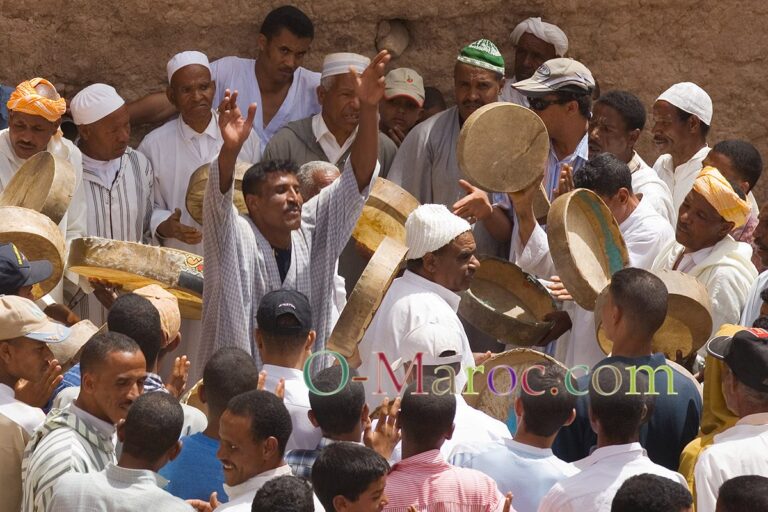As the Islamic calendar is lunar, the dates given here are “calculated” to the nearest day. In addition, Morocco is often a day behind the dates used in Saudi Arabia or Europe, due to its geographical position. Its name means Arabic “country of the last sunset“, the farest in the West”!
Religious celebrations
Although, in the strictest sense of the term, Islam recognises only two festivals, Eid al Fitr (which marks the end of Ramadan) and Eid al Adha, which commemorates the sacrifice of Abraham, in practice there are many more days of religious celebration.
-
Ras el Am
- the first day of the Hegira, the Muslim New Year. It is a festival not because it begins the year, but in commemoration of the Hegira. The next one will take place on Wednesday 17 June 2026.
-
Ashura, the 10th of Muharram, the first month of the Muslim year
- Officially, the festival commemorates the crossing of the Red Sea and the miracle that saved Moses and his followers from Pharaoh. In some places, its ritual corresponds to our carnival, which can lead to it being likened to a festival for the dead.
In Morocco, it is mainly a festival for children. -
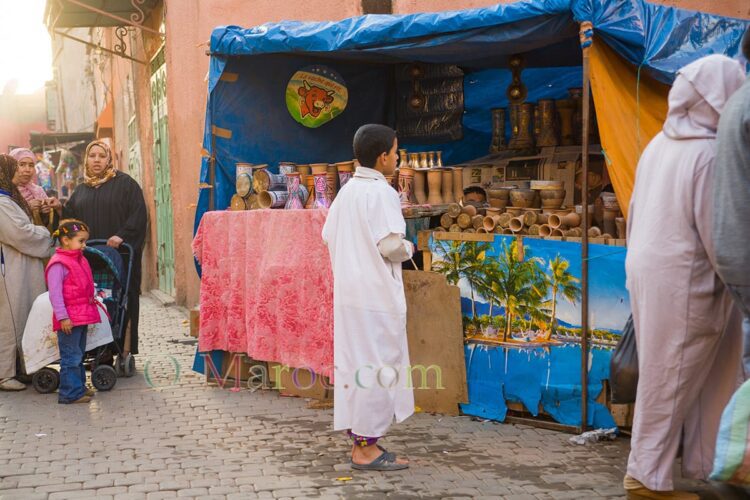
In a derb (neighbourhood) of Marrakesh’s medina, a young boy chooses his darbouka (drum) for Ashura. - The next Ashura will take place on Friday 26 June 2026. Ashura in Morocco has absolutely nothing to do with the bloody Shia rituals that commemorate and atone for the death of Hussein at the Battle of Kerbala.
-
The Mawlid
- or the anniversary of the birth of the Prophet Muhammad (presumed to be 20 August 570 AD), is celebrated with processions, lectures and stories about his life. The next one will take place on Wednesday 26 August 2026 (12 Rabi’ al-awwal). Many moussems in the Zagora region take place on this date.
Leïla al-Ghaïbah (15 Rajab)Anniversary of the conception of Mohammed. The next one will take place on Sunday 4 January 2026. I don’t remember where I found it, but I’ll leave it here because it’s easy to see who has copied this text (do a Google search!). It is, however, a Shiite celebration, that of the death of Zayneb, the Prophet’s granddaughter.-
Layla al-Miraj, 27th of the month of Rajab
- This is the night of the journey and the ascent to heaven. It commemorates Muhammad’s journey from Mecca to Jerusalem and from there to heaven on the same night. During this journey, the commandment of the five daily prayers was revealed to him. The next one will take place on Friday 16 January 2026
-
Layla al-Bara’a, the night of forgiveness, 15th of Sha’ban
- Two weeks before Ramadan, Muslims seek forgiveness for their sins. Many Muslims believe that during this night, God determines the destiny of each person for the coming year. This night is spent in prayer, asking God for guidance and forgiveness. Some fast during the day. The next one will take place on Tuesday 3 February 2026
-
The holy month of Ramadan
- The next one begins on Wednesday 18 February 2026. Throughout the month of Ramadan, life is turned upside down: little activity during the day because of the fast and a festive atmosphere as soon as night falls.
-
Layla al-Qadr, the Night of Destiny, at the end of Ramadan
- It corresponds to the revelation of the Quran. It takes place during the last week of the month of Ramadan, on an odd night (21°, 23°, 25°, 27° or 29°). As its exact date is unknown, Muslims spend these last few nights in prayer for God to grant a good destiny. Based on the 27th day, the next one would take place on Monday 16 March 2026.
-
Eid el Seghir, or Eid el Fitr
- The “little feast” as opposed to Eid el Kebir], which marks the end of the month of Ramadan. 1st and 2nd Shawwal (according to the Muslim calendar): Friday 20 March 2026 (A public holiday)
-
Arafat, the 9th day of the pilgrimage
- The day before Eid el Kebir, it corresponds to the 9th day of the pilgrimage when millions of pilgrims gather on Mount Arafat and pray for the forgiveness of sins. The next Arafat will take place on Tuesday 26 May 2026.
-
Eid el Kebir
- or Eid al-Adha [The “Great Festival”] commemorates the sacrifice of Abraham. It is the sheep festival. 10 and 11 Dhu al-Hijjah (according to the Muslim calendar): Wednesday 27 May 2026 (3 public holidays)
-
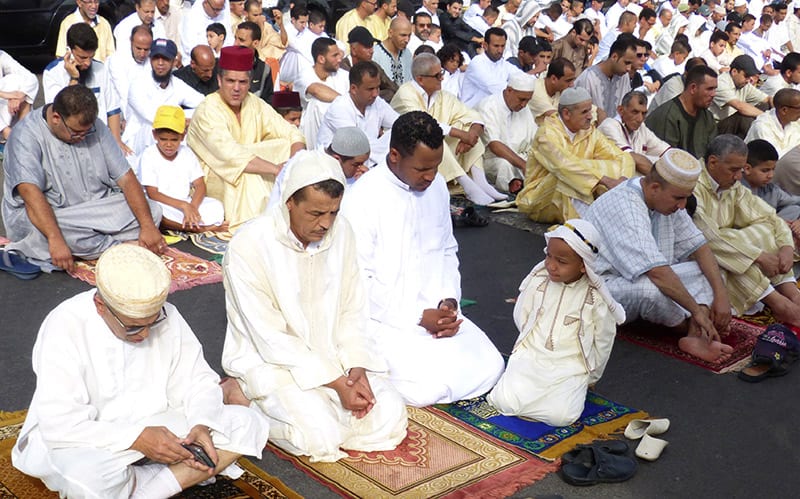
Eid morning prayer, even the little boy has beautiful new clothes!
Although they are not public holidays, Jewish celebrations are also well known in Morocco, and are often wished by Moroccan Muslims to their Jewish friends or neighbours, particularly Pesach.
Finally, on the occasion of these festivals or at other times, many moussems take place, but that deserves a whole post!
The other holidays
These festivals and public holidays are fixed. They may be the adoption of international celebrations or the commemoration of events in recent Moroccan history. As in all the world’s monarchies, Throne Day changes with each king. Under Hassan II, it was held on 3 March, and on 18 November under the Protectorate.
- 1 January: New Year
- 11 January: Independence Manifesto
- 14 January: Berber New Year (public holiday from 2024). The year 2024 corresponds to 2974 in the Berber calendar. The Berber calendar began with the founding of the XVIIth Egyptian dynasty in 950 BC by a Berber military leader, Sheshonk. It remains aligned with the Julian calendar.
- 1 May: Labour Day
- 30 July: Throne Day or ‘eid al-julus
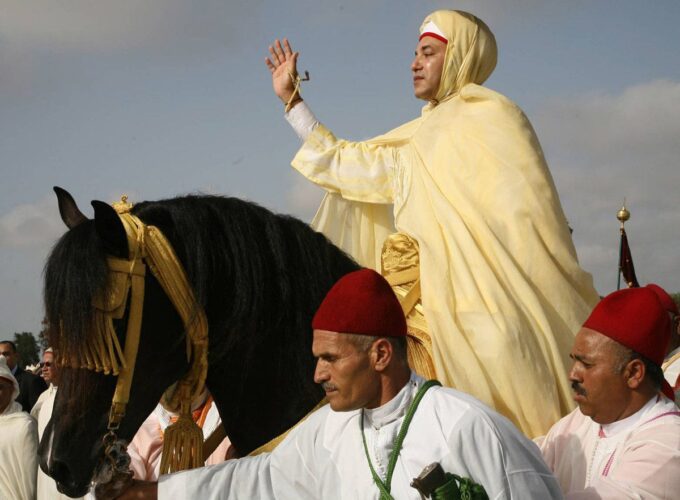
The parade on horseback is one of the highlights of the Festival of the Throne. - 14 August: Oued Eddahab Feast of Allegiance (not a public holiday), marking the reunification of the provinces of the deep south and of major political significance.
- 20 August: Anniversary of the Revolution of the King and People. It commemorates the deportation of the Sultan Mohammed V, after he was deposed by the French authorities in 1953. This event provoked a surge of nationalism in the population, outraged by this gesture by the occupying power.
- 21 August: King’s birthday Mohammed VI.
- 6 November: Anniversary of the Green March (the huge demonstration of some 350,000 volunteers which marked Morocco’s claim to the Western Sahara in 1975.
- 18 November: Independence Day. It does not commemorate the end of the French Protectorate over Morocco in 1956, but the triumphant return from exile of Sultan Mohammed V in 1955 after his removal by Paris and his forced stay in Madagascar.
Traditions from abroad
Moroccans have appropriated many Western celebrations, which grates on the teeth of the strict religious (there are only two festivals in Islam) or the advocates of Moroccan authenticity (these are not our traditions).
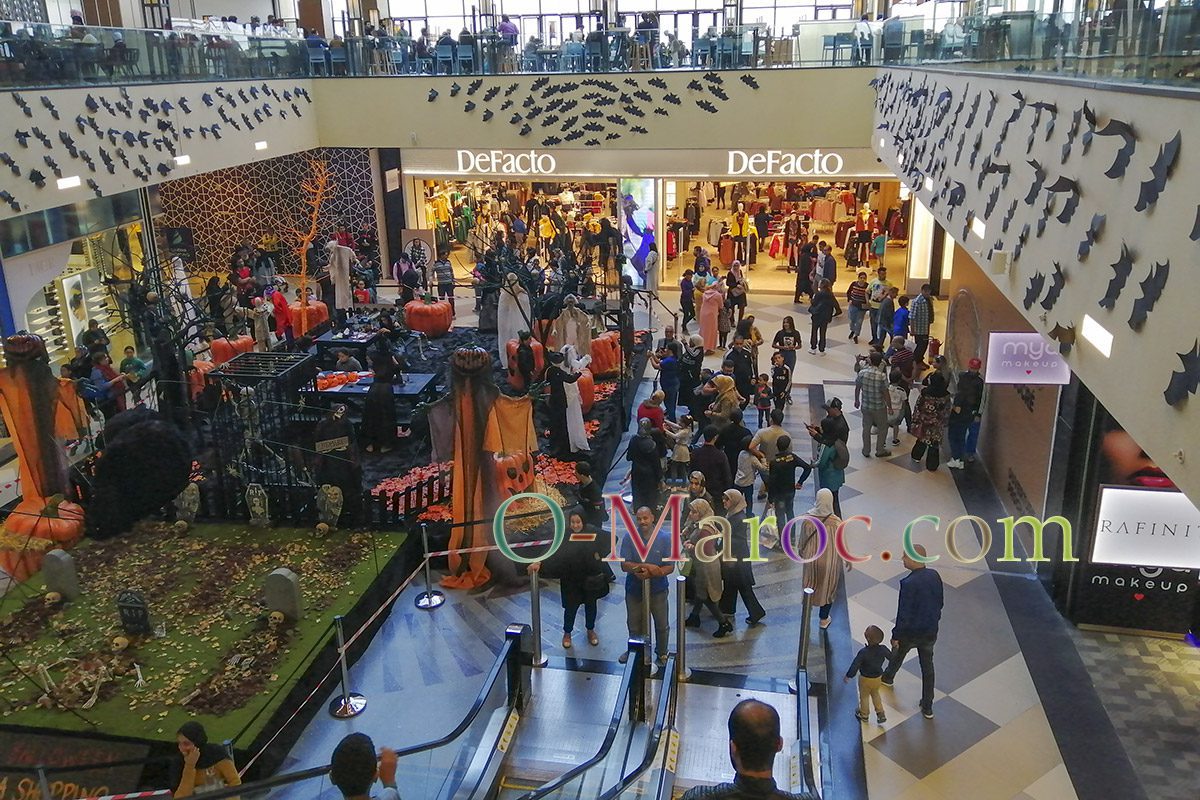
Christmas celebrations tend to be reserved for foreign or bi-national families, but the shops sell gifts and Christmas trees. In recent years, Halloween has arrived, with its procession of masks and monsters (which would be more at home during Ashura celebrations).
Moroccans’ private celebrations
Finally, Moroccans celebrate on many occasions:
- Birth, with the naming ceremony, on the seventh day, and the circumcision if it is a boy, which can take place later.
- Engagement, and even more marriage, Moroccan weddings are known for their rituals, their decorum and the bride’s seven outfits!
- Return from the Hajj, where all the relatives pick up the pilgrims at the airport and take them home.

Procession to welcome pilgrims to Tazzarine - Bereavements are also accompanied by a reception, so that everyone can come and express their condolences, and a prayer ceremony accompanied by donations, the sadaqa.
 A typo or syntax error? You can select the text and hit Ctrl+Enter to send us a message. Thank you! If this post interested you, maybe you can also leave a comment. We'd love to exchange with you !
A typo or syntax error? You can select the text and hit Ctrl+Enter to send us a message. Thank you! If this post interested you, maybe you can also leave a comment. We'd love to exchange with you !

